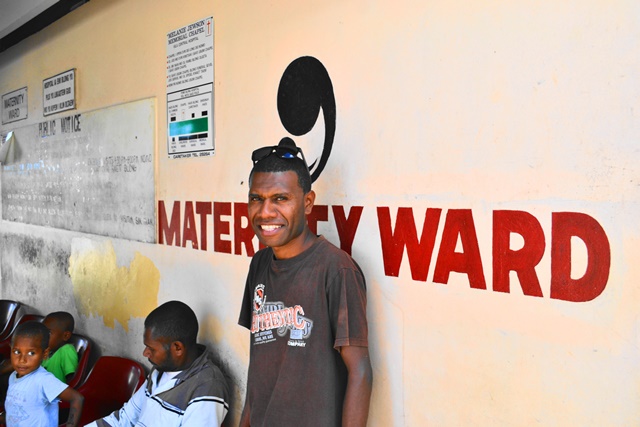UNFPA Pacific, Port Vila, Vanuatu (March 26, 2015) - You couldn't wipe the smile off his face when the cries of a new-born baby rang through the maternity ward of the Port Vila Central Hospital in Cyclone Pam-ravaged Vanuatu.
Benson Ezra, 30, had just finished recounting the ordeal of having to travel with his girlfriend to the hospital in a bus early on Sunday morning, as Vanuatu continued to pick up the pieces across the country, with evacuation centres still numbering 3000 on March 23.

Unaware of the sex of his firstborn at the time of the interview, Mr Ezra expressed a bias for a daughter - a wish that came true about half an hour later.
"We want to be able to give my child the best that we can because I want our child to have a good future," Mr Ezra said. With 25-year-old Melani, his girlfriend of three years, the new parents want to have only one child.
"We know that we want only one child and we have discussed the method of family planning we want to use after this," he said.
Mr Ezra is from one of the outer provinces of Vanuatu, Malekula, and the second biggest island of the 83 islands which make up Vanuatu; he works for the national airline of Vanuatu and Melani works for a hotel.
"My parents talk about it with us, about planning the number of children so we can give them a good future," Mr Ezra said, counting his siblings who have also chosen to have one child.
Mr Ezra said he heard about reproductive health and options on family planning services on a national radio program on reproductive health and rights. The radio program was borne out a United Nations Population Fund (UNFPA) refresher training on family planning and competency training on jadelle assertion and removal for stakeholders including non-government organisations and nurses from outer islands.
"The training was revolutionary in terms of the choices women in Vanuatu now have as far as long-term contraceptives are concerned and in terms of strengthening the capacity in the outer islands," UNFPA family planning and youth reproductive health specialist, Claire Davis said.
Senior midwives at the Port Vila Central Hospital confirmed 81 births since Cyclone Pam, as of March 22, including two emergency caesareans.
With assessment results now providing more clarity on Vanuatu's national disaster situation, a United Nations Population Fund (UNFPA) team arrived March 22 with critically-needed maternal health and family planning supplies. The first shipment of dignity kits arrived at the Vanuatu Central Medical Stores (CMS) yesterday.
Based on the findings of the 2013 Demographics Health Survey, the UNFPA estimates there are 56,000 women of reproductive age of which 6700 are estimated to be pregnant. It's estimated 300 women may experience pregnancy-related complications over the next three-month period.
The United Nations (UN) estimates 166,600 people were directly affected by Cyclone Pam, a storm system labelled a "monster" by meteorologists even before it hit Vanuatu between March 13 and 14.
It is estimated 65,000 people are without shelter across 22 of the worst-affected islands. Five provinces have been identified priority - Shefa (99,672 people estimated to be affected), Tafea (34,918), Penama (22,645), Malampa (8841) and Torba (591).
As of March 23, neonatal services have resumed from the main Port Vila Central Hospital. Non-government organisation partners are also providing reproductive health-related services including family planning.
The UNFPA and grassroots Vanuatu non-government organisations (NGOs) agreed on a general framework of collaboration Monday, that will drive assistance by and for their communities. The gathering marked the first time that over 20 community-based NGOs committed to sexual and reproductive health and gender protection converged to plan lifesaving responses.
UNFPA Pacific Sub-Regional Office team leader Gideon Mael said the meeting was to mobilise critical local partners for a SRH response to Cyclone Pam, and to share information on UNFPA's humanitarian mandate and capacity as a partner.
"The UNFPA has always engaged civil society in its programming and we recognise that their participation was crucial - they know the local context and they have their networks which reach deep into communities all the way to the most vulnerable though some of the most resilient," Mr Mael said.
"The meeting was a dynamic discussion, they all knew what their communities needed and they submitted their priorities and budgets, for action over a three-month period."
The discussion which included the Ministry for Health, National Youth Council and Department of Women, and affiliate organisations of the civil society umbrella body, Vanuatu Association of NGOs (VANGO) revolved around four main areas; sexual reproductive health in emergencies, adolescence sexual reproductive health, gender-based violence prevention and response and community-based psychosocial first-aid.


